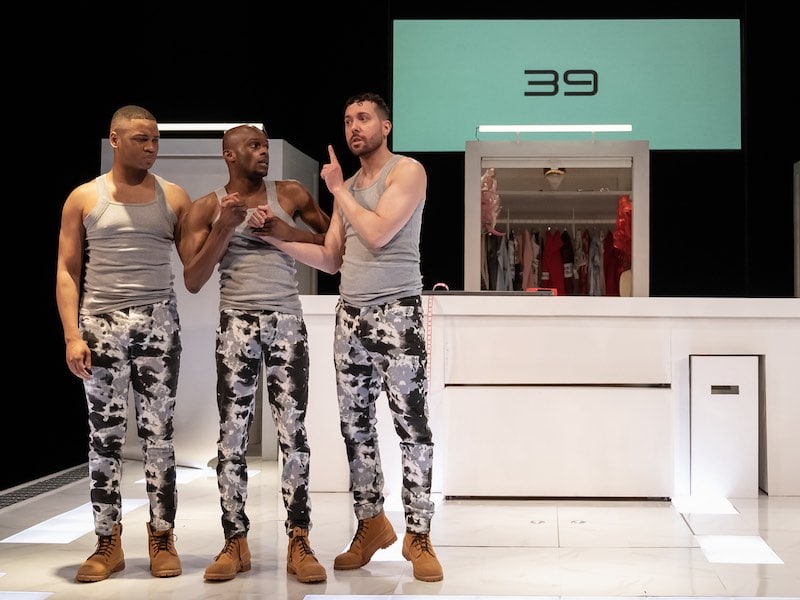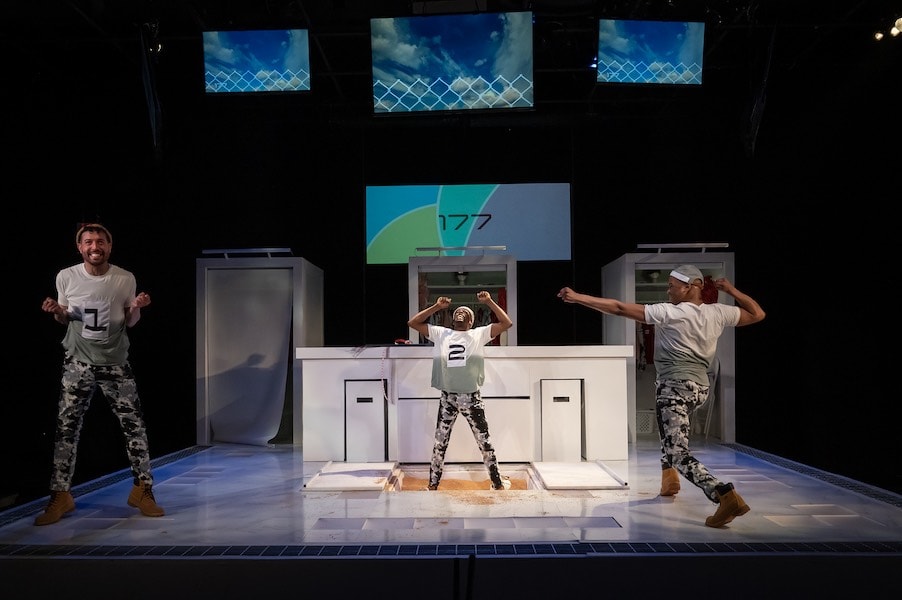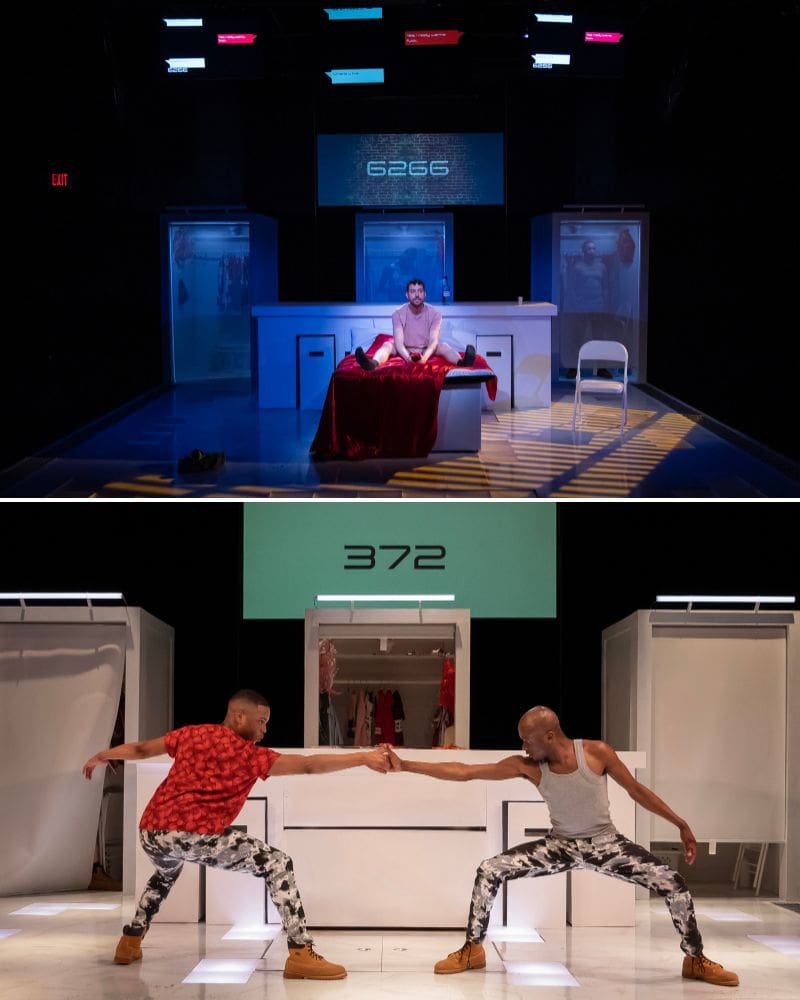What’s so engrossing about Mosaic Theater Company’s one in two, playing this month at Atlas Performing Arts Center, is the way its Black male actors fling their bodies into each scene.
It’s the way Justin Weaks curls up his 6-foot, 140-pound frame on a plastic folding chair, or Ryan Jamaal Swain rolls and twists his half-nude body while vacuuming dirt off the stage, or Michael Kevin Darnall cradles the bare knees of his partner as he details an especially painful experience. Or when all three, playing their unhindered childhood selves, chase each other across the stage in an exuberant game of duck, duck, goose.

Since its inception, American theater has fetishized, dehumanized, and exploited Black men’s bodies. But here, Director Raymond O. Caldwell forces us to stare at and engage with the physical and emotional contours of three Black male bodies and poses a provocative and still-relevant question: how will you react if you learn one of those bodies is now diagnosed with HIV?
Almost half of all Black American gay or bisexual men are expected to be diagnosed with HIV in their lifetime, according to an ominous 2016 CDC prediction. Playwright Donja R. Love explores in this humorous, incisive play how the ongoing stigma of HIV has distorted the relationships Black gay men have with each other, their families, and themselves.
What’s most impressive about this play is the stunt Darnall, Swain, and Weaks pull off at the beginning of the show. As part of an effort to explain what one calls the play’s “amorphous…non-existent ass plot,” they break the fourth wall and ask the audience to vote, through a round of applause, on which actor they want to take the lead role, Donté — recently diagnosed with HIV and tasked through a series of scenes to walk through the many ways his community responds to the revelation of his status. The other two actors decide, through a game of rock paper scissors, who will play which supporting roles.
Considering this unusual stunt, it’s very possible that your experience inside Atlas Performing Arts Center’s Sprenger Theatre will vary drastically from mine depending on who’s voted to play the lead and supporting roles.
But the show’s overall message is a worthwhile one for Washington, DC-ers to grapple with (more than 11,000 people in the District, the majority of them Black and gay, have been diagnosed with HIV).
The astronomical rate of HIV within the Black gay community has been explained away in past decades as indicative of their promiscuous behavior, their refusal to wear condoms or seek medical care, God’s punishment, and a “medical mystery.”

We now know that it’s the result of a confluence of factors that include their disproportionate lack of access to healthcare and insurance, their doctors’ unwillingness to ask them about their sexual activities, the prison and military industries’ sloppy handling of HIV diagnoses, the insular nature of Black gay communities, and, yes, culture.
When Black gay men are diagnosed, the rampant stigma associated with the disease — immoral, cursed, dirty, infectious — shames them into refusing to tell their sexual partners, families, and friends, compounding the crisis.
Playwright Love, who was diagnosed with HIV on December 13, 2008, found himself a decade later in a depressive and suicidal state, and decided to type out on his phone as a form of therapy a play about the “ugly, dark moments” HIV and its stigma has caused. A run-in with another alcoholic, HIV-positive Black gay man who refused to take his medication led him to decide to get his sketch of a play produced.
“I would love it if I could be able to give this to my community, to help heal,” he said in a 2019 interview before a New York City run of the play.
What a courageous decision.

The stage, designed by Nadir Bay, is first presented as a hospital waiting room with three wardrobes, but throughout the 90-minute production it transforms into a playground sandbox, a gay bar, a bedroom, a bathroom, a hospital room. There are dozens and dozens of props (Deb Thomas, designer) that spring from backstage, behind set pieces, and underneath the floor.
Lighting designed by John D. Alexander and projections designed by Deja Collins provide crucial subtext, helping the stage transform between time and place and dictating to the audience a series of stats (some of which are eventually explained and some of which are not).
In the performance I saw, Darnall played Actor #1 (Donté), Weaks played Actor #2 (Mom, Banjii Cunt, Trade, Person at Bar), and Swain played Actor #3 (Bartender, Nurse, Kinda Ex-Boyfriend, Married Man). That they each managed to remember their lines, change into the appropriate costumes (designed by Brandee Mathies), and pick up the right prop through the intermission-less show is jaw-dropping.
The acting is conversational, fast-paced, at times improvisational. The code-switching — something Black gay men, who straddle femininity and masculinity, white, and Black have long had a knack for doing — is convincing. And the conviction the actors deliver is the type that only real-life experience could bring to the stage.
Weaks throughout toys with the audience’s emotions in a masterful way, exaggerating movements, drawing laughter, slipping into and out of sagging jeans and frilly pink hats.
It’s here that I should stop and point out the exceptional work of Sierra Young, the show’s fight and intimacy director.
Darnall, Swain, and Weaks are visibly aware of the space they take up and unabashedly use their bodies to tell their stories. A sex scene is at once believably intimate and then immediately cold. The hand-holding, kisses, fist bumps, and a moment when “Trade” blows smoke from his blunt into Dante’s mouth convey the respect and dignity that Black male bodies on stage are so often deprived of.
one in two plays through June 25, 2023, presented by Mosaic Theater Company performing in the Sprenger Theatre at Atlas Performing Arts Center, 1333 H Street NE, Washington DC. For tickets ($29–$64), call the box office at 202-399-6764, or go online. Rush, student, senior, military, and First Responder discounts are available at mosaictheatre.org.
The program for one in two is downloadable here.
COVID Safety: Mosaic Theater aligns its safety protocols with those of the Atlas Performing Arts Center. Masking is recommended; however, it is no longer mandatory —masks in theaters and public spaces at the Atlas Performing Arts Center are now optional. For the latest information, visit mosaictheater.org/health-and-
SEE ALSO:
The cast of ‘one in two’ at Mosaic Theater on why they take it personally (interview by Gregory Ford, May 17, 2023)




